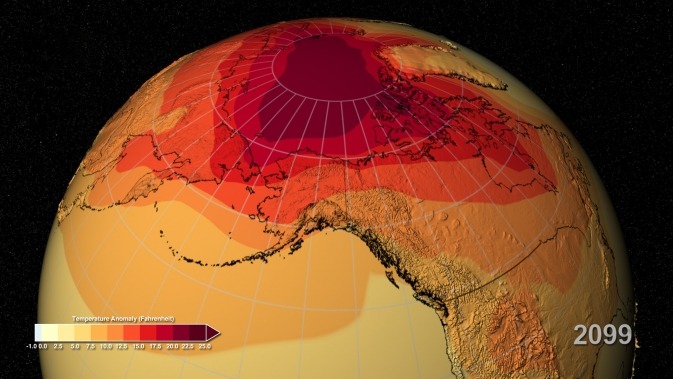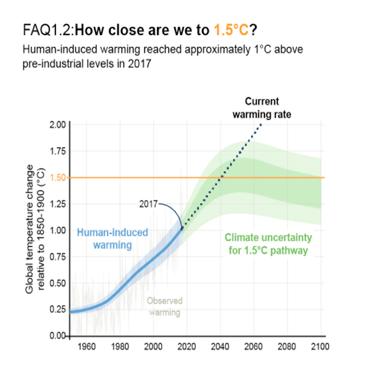On October 8, 2018 IPCC reported in its ‘summary for policymakers’ that the world would benefit by limiting the global warming above pre-industrial levels. to 1.50 C by year 2100. This was approved by all governments. However, at home, the governments resumed ‘business as usual’ – relentlessly pursuing ever higher GDP by growing the economy. Quite oblivious of the IPCC warnings they had agreed to.
Global energy demand grew by 2.1%, more than twice the growth rate in 2016, resulting in robust world economic growth of 3.7%. 40% of this growth came from China and India, 70% of which comes from fossil fuel, needless to say producing more CO2 and world ppm rose to an unprecedented 410.
The fundamental question we might ask: ‘Is it necessary for us to have such a growth rate today?’ May be we are locked into our capitalist economic system. The changes advocated by IPCC in ‘Summary for policymakers’ simply cannot be reached by tweaking with fine adjustments. But how can we achieve the fundamental challenges envisaged by IPCC?
Now, all this is very bad news for Climate Change. In fact, as we can see in the following graph, we are already dangerously close to to 1,50 C around 2040, only 20 years time.
Since the earth has warmed by 10 C from pre-industrial age, extreme weather in terms of hitherto unprecedented strong hurricanes, flooding, 250 km/hour winds are already here and their destructive power is already evident in many parts of the world.
A visitor from outer space looking at the current state of the world might comment: ‘ Are these Earthlings crazy, irrational or simply out of their minds? They are intelligent creatures, and they have developed sophisticated technology to enable them to predict the future under different scenarios. On top of this they have already seen some examples of the devastation and destruction caused by extreme weather. Yet, the governments are not changing course, they insist on this suicidal path which they know will lead to further disasters with untold unprecedented suffering for an even greater number of people. So are they insane?’
Any reader of this article should reflect soberly on what an individual can do to alleviate and mitigate the coming disasters not in the long term future but in just decades time. Can we vote sensible politicians dedicated to the environment into the government, may be start lawsuits or is it more effective to organize citizen action groups to put pressure and radically change our government? This is particularly relevant to the millennials and those coming of age, the 18 year olds, because they have most to lose.
Can society come together at this very critical juncture? Urgent action is needed for our own future and that of generations to come.
REFERENCES
[1] 2018/24/PR IPCC PRESS RELEASE 8 October 2018 Summary for Policymakers of IPCC Special Report on Global Warming of 1.5ºC approved by governments.
[2] CO2 Emissions from Fuel Combustion – International Energy Agency. https://www.iea.org/publications/…/CO2EmissionsfromFuelCombustionHighlights2017.p…
[3] Global energy and CO2 status report 2017 https://www.iea.org/publicaions/freepublicayions/publicayions.GECO2017.pdf
[4] 3.5 IPCC Scenarios of the 21st Century www.ipcc.ch/ipccreports/tar/wg2/index/php?idp=29
[5] Long-term Climate Change: Projections, Commitments and – IPCC
https://www.ipcc.ch/pdf/assessment-report/ar5/wg1/WG1AR5_Chapter12_FINAL.pdf
[6] Major Climate Report Describes a Strong Risk of Crisis as …www.nytimes.com/…/ipcc-climate-report-2040.html
[7] Climate Change: Even worse than we thought! Sierra club https://www.sierraclub.org/sierra/climate-change-even-worse-we-thought-ipcc-report
[8] Does global warming make tropical cyclones stronger? Real Climate strongest tropical cyclones www.realclimate.org/index…/does-global-warming-make-tropical-cyclones-stronger?
Gioietta Kuo, MA Cambridge, PhD in nuclear physics at Birmingham, Atlas Fellow at St Hilda’s College, Oxford. She spent 12 years at Princeton University Plasma Physics Lab and has over 70 professional articles and over 100 articles on environmental problems featured in World Future Review (wfs.org), amcips.org, the MAHB and other worldwide think tanks. Additionally, she has published work in ‘People’s Daily’ and ‘World Environment’ – Magazine of the Chinese Ministry of Environmental Protection, and others in China. She can be reached at <kuopet@comcast.net.>
The views and opinions expressed through the MAHB Website are those of the contributing authors and do not necessarily reflect an official position of the MAHB. The MAHB aims to share a range of perspectives and welcomes the discussions that they prompt.

